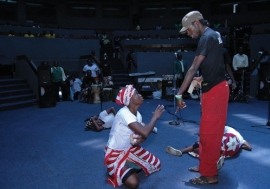Humiliation: The latest form of gender violence
Humiliation: The latest form of gender violence
Commuter bus terminals in Zimbabwe are slowly becoming the new battlegrounds in an undeclared war against women. Often, small gangs of touts pounce on women and girls at bus stations in major cities, accuse them of indecent dressing and sometimes strip them naked in public.
The worst example of this new variation of misogynist violence happened last December when a group of touts attacked a woman at one of the major bus stations in the capital, Harare, and stripped her naked for the “crime” of wearing a mini-skirt. She managed to escape after paying a commuter omnibus crew $2 to hide her from the mob. Police arrested two of the attackers who are still in custody awaiting trial, but the other suspects are still at large.
The public stripping of women accused of indecent dressing is the latest in a series of attacks against women in Zimbabwe based solely on gender. The problem is exacerbated by the country’s worsening economic conditions that have been straining family relations. Other forms of gender-based violence include intimate partner or spousal violence, rape and sexual assault, pedophilia, family rape, sexual coercion and harassment, human trafficking and sexual exploitation and abuse especially of girls.
As in other parts of the world, many cases of violence against women in Zimbabwe go unreported. But the few that make it into the docket books paint a troubling picture. Worse still, these cases are not always treated as crimes. “As a society, we need to understand that violence against women is a criminal offense and therefore cannot be excused,” Virginia Muwanigwa, the chairperson of the Women’s Coalition of Zimbabwe, a group that champions the rights of women and girls in Zimbabwe, told Africa Renewal in an interview.
Musasa Project, a group that provides shelter, legal advice, social counselling and skills training to survivors of violence, last year handled more than 21,500 cases of violence against women compared to 10,402 cases in 2013. According to the group’s programme officer, Vimbai Njovana, these were mainly sexual and domestic violence cases in just four cities. The project processes an average of 30 to 50 cases of gender violence in its Harare office alone.
UN Women’s Gender Specialist, Michelle Gudo, said her organisation runs a three-year programme dedicated to the prevention of violence against adolescent girls and young women.
“Offering support to women is not enough,” says Ms. Njovana. “We need economic empowerment projects to spruce them up financially. Women are the face of poverty as most of them look up to their spouses for financial support.”
Figures on domestic violence from police authorities are especially distressing. Last year the police handled more than 4,600 cases of domestic violence in the capital city, up from 2,505 the previous year.
As the rate of violence against women continues to rise, gender advocacy groups have developed a new approach in their campaign against the scourge. The exercise involves enlisting men’s organizations and urging them to turn their members against gender-based violence. One such organization is the Padare Men’s Forum on Gender, which focuses on men’s involvement in promoting gender equality in Zimbabwe.
In addition to enlisting men in its new anti-violence campaign, the Forum has increased its advocacy for strong legal frameworks against gender violence and working with women organizations to foster gender equality.
“We engage men in positions of power such as chiefs, pastors, village heads, members of parliament and local councillors to help curb GBV [gender-based violence] in the country,” says Kelvin Hazangwi.
Zimbabwean laws such as the Domestic Violence Act of 2007 exist on the books but are not strictly enforced because of limited resources, poor coordination among various actors and public resistance based on patriarchal and religious beliefs. On the part of the government, the acting Minister for Women’s Affairs, Gender and Community Development, Christopher Mushowe, says his ministry is working to ensure that its GBV strategy is implemented successfully.
























